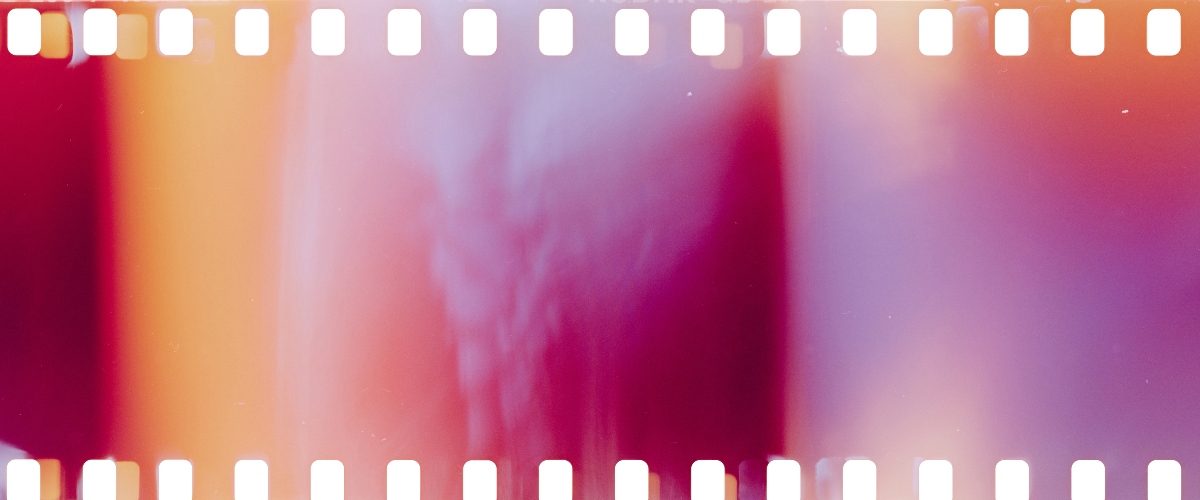
Literary Dispatches from the 2023 Sundance Film Festival
Jihane Bousfiha on Cat Person, Eileen, Shortcomings, and More
As the first major festival of the year, Sundance has the honor of giving a first glimpse of what cinema has to offer in the forthcoming months. Making its return to Park City, Utah, after two years of virtual editions, Sundance’s expansive lineup features a blend of high-profile titles and low-key indies equally worthy of attention.
This year’s festival had much to offer in terms of literary adaptations, with source materials ranging from a graphic novel to a viral short story to a coming-of-age memoir. Below is a selection of the literary adaptations that made their debuts—both dazzling and disappointing—at Sundance.
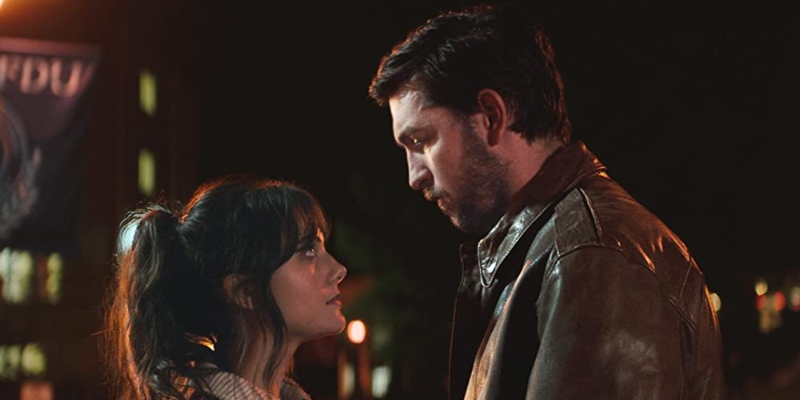
Cat Person
Based on: “Cat Person” by Kristen Roupenian
Following the success of genre films exploring gender dynamics like Promising Young Woman (2020) and Fresh (2022), which both got their starts at Sundance, it makes sense that the festival would keep that streak going with another polarizing title spotlighting the horrors of heterosexuality. What better to achieve this than Cat Person—the Susanna Fogel-directed movie based on Kristen Roupenian’s viral 2017 New Yorker short story of the same name? When it was published nearly six years ago, Roupenian’s story was inescapable for anyone who spent time online. Having provoked seemingly endless discourse, translating it to the screen was never going to be an easy feat.
Cat Person had the potential to spark as much intellectual discourse as its source, but became a parody instead.
Much of the film’s general premise remains the same: it chronicles the relationship between 20-year-old college student Margot (Emilia Jones) and an older man named Robert (Nicholas Braun), a regular at the independent cinema where she works. Margot initially thinks it harmless to give Robert her number, and they develop a text-based relationship that blossoms, even as she’s plagued with the fear that he may be capable of hurting her.
They eventually meet in person, much to the objection of Margot’s roommate Taylor (Geraldine Vishwanathan), resulting in awful sex that Margot isn’t fully into but goes along with anyway. Cat Person is at its best when exploring the anxieties of modern dating that women experience, but once it ventures beyond the scope of its source material, it enters a downward spiral.
For all its flaws, the brilliance of Roupenian’s story was that it left things open for interpretation, but Cat Person the movie chooses to spell out every little detail. While the on-the-nose Margaret Atwood quote that opens the film—“Men are afraid women will laugh at them. Women are afraid men will kill them”—may be fitting, there’s nothing subtle about what comes after. Whereas Roupenian ended the story with a breakup-by-text, Fogel and screenwriter Michelle Ashford invented their own baffling conclusion that veers into horror territory. Cat Person had the potential to spark as much intellectual discourse as its source, but became a parody instead.
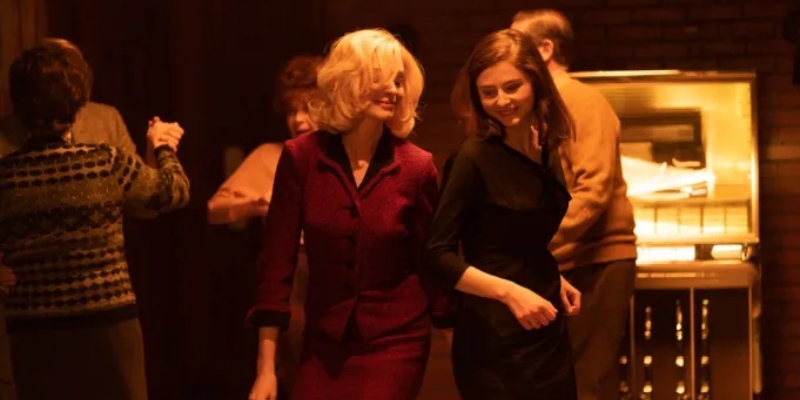
Eileen
Based on: Eileen by Ottessa Moshfegh
With the hype surrounding Ottessa Moshfegh’s novels, one would have to be wary of attempts to adapt them. But in the hands of William Oldroyd—whose 2016 psychological thriller Lady Macbeth makes him a perfect match for Moshfegh’s brutally raw writing—Eileen is an intoxicating film noir adaptation of her 2015 debut novel. (In terms of integrity, it also helps that Moshfegh co-wrote the script, along with her husband, author Luke Goebel.)
The eponymous Eileen Dunlop (Thomasin McKenzie) is a sexually frustrated and socially awkward young woman who works as a secretary at a juvenile prison and lives with her raging alcoholic ex-cop father (Shea Whigham) in a snowy New England town circa the 1960s. With the arrival of the alluring Rebecca St. John (an exquisite Anne Hathaway) as the facility’s new psychiatrist, Eileen’s mundane and uneventful life takes a turn. She quickly becomes enamored with the older, Harvard-educated, cigarette-wielding, blonde-bobbed femme fatale who also takes an interest in Eileen. Their leisurely paced dynamic, defined by a burning longing that drives the film—even as you question what exactly they feel for and want from one another—has shades of Ingmar Bergman’s Persona (1966) and Todd Haynes’s Carol (2015).
No one writes about the all-consuming feeling of obsession quite like Moshfegh.
Without the unreliable narrator’s internal monologue digging into some of the novel’s more disgusting elements, there’s an underlying mystery to onscreen Eileen that we never get to see—but her macabre fantasies (having sex with a handsome young correctional officer, shooting herself and her father in the head) still appear in moments of surrealism. No one writes about the all-consuming feeling of obsession quite like Moshfegh, and Eileen is utterly pulpy, sensual, and delicious.
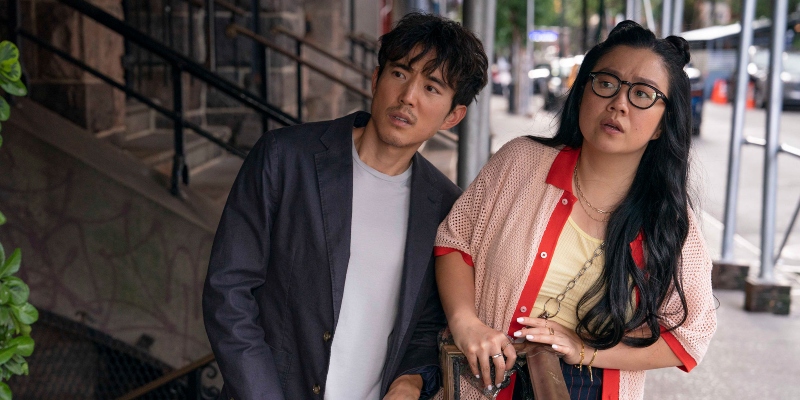
Shortcomings
Based on: Shortcomings by Adrian Tomine
The first of two San Francisco-set adaptations appearing in this year’s lineup, Shortcomings is a sweet slice-of-life comedy full of flawed yet fleshed-out characters. Based on the 2007 graphic novel by Adrian Tomine, who also adapts his work for the screen, Shortcomings is divided into chapters as it follows Ben (Justin H. Min), a self-absorbed aspiring filmmaker who runs a local arthouse movie theater, as he navigates life after a split with his New York-bound girlfriend, Miko (Ally Maki), by pursuing a string of blonde white women, despite the warnings of his lesbian best friend, Alice (a scene-stealing Sherry Cola).
Ben may be insufferable (just as he is in the graphic novel), but Tomine and actor-turned-director Randall Park, who has said that he was initially drawn to the writer’s messy characters, manage to capture it with a refreshing nuance. The pair never make this ensemble of somewhat annoying, imperfect characters feel like caricatures; rather, they’re complex and vulnerable individuals with their own issues who, like the rest of us, are learning as they go.
The movie is littered with film references that feel tailor-made for cinephiles.
Though much of the graphic novel still feels relevant 16 years later, Tomine updates his material to fit within a modern context—the movie is littered with film references that feel tailor-made for cinephiles. At one point, Ben runs down the street à la Greta Gerwig in Frances Ha. and the film is bookended with scenes parodying Crazy Rich Asians, addressing the ways in which the commercially successful movie impacted representation, both positively and negatively (while indicating that it’s more so the latter). Deftly balancing elements of humor with social commentary on identity, romantic relationships, and the role of Asian Americans in Hollywood, Park makes a delightful feature debut that feels like a breath of fresh air.
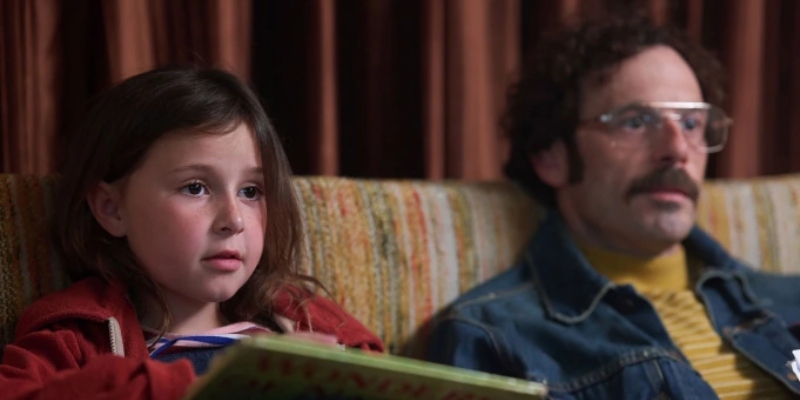
Fairyland
Based on: Fairyland: A Memoir of My Father by Alysia Abbott
For his debut feature, photographer Andrew Durham adapts Alysia Abbott’s 2013 memoir Fairyland: A Memoir of My Father, which details her upbringing with her queer father in the wake of her mother’s death in a car accident. The film begins with Alysia (played by Nessa Dougherty) and her dad, Steve (Scoot McNairy), moving to San Francisco in the 1970s to pursue his writing career and live openly as a gay man.
Shot on grainy 16mm, the scenes capturing Alysia’s early childhood are vibrantly nostalgic
Alysia is provided with a bohemian childhood in which Steve emphasizes the need for independence. When we lurch forward in time to the mid-80s, a teenage Alysia (now portrayed by Emilia Jones) has started to feel insecure about her unconventional upbringing and hides her father’s sexuality from her friends. As she later attends college at NYU and spends a summer abroad in Paris, the AIDS epidemic creeps closer until Alysia must return home to care for her ill father.
Shot on grainy 16mm, the scenes capturing Alysia’s early childhood are vibrantly nostalgic, like a collage of memories woven together. Rooted in Alysia’s point of view, Fairyland operates as a coming-of-age story, but Durham steers clear of leaning too far into the genre’s clichés. Ultimately, the film is a tender, decades-spanning tale about imperfect parenting and the evolving, increasingly strained relationship between a daughter and her sometimes-neglectful father trying his best. Though Fairyland is imperfect with its monologue-heavy writing, it’s a heartfelt, emotionally rich, and deeply personal work carried by sensational central performances, especially from McNairy, who’s finally given the chance to showcase his immense talent in a way that’s guaranteed to make you sob.
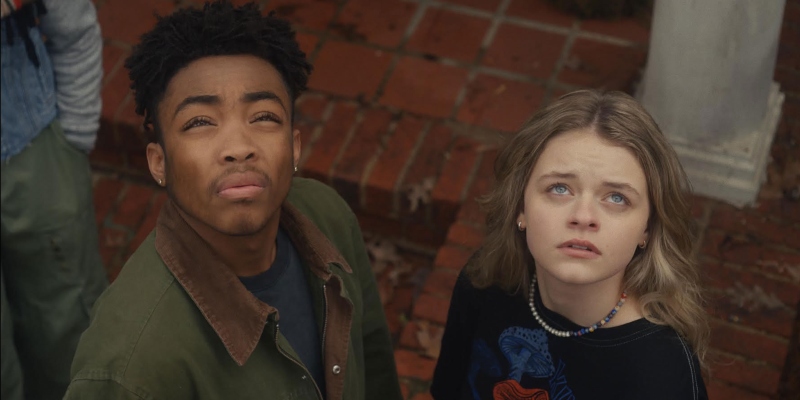
Landscape with Invisible Hand
Based on: Landscape with Invisible Hand by M.T. Anderson
In the world of Cory Finley’s third feature, Landscape with Invisible Hand, an adaptation of M.T. Anderson’s 2017 YA novel, an alien species called the vuvv have taken over Earth. They’ve brought technological innovations that disrupted the economy, causing the end of employment and leaving non-elite humans to scavenge and struggle to survive.
Beginning in 2036, five years after the aliens first arrived, the film centers on teenager Adam Campbell (Asante Blackk), a budding artist who uses his work as a way of making sense of these uncertain times. When his new classmate Chloe (Kylie Rogers) and her family are displaced and living out of their car, Adam invites them to live in the basement of his mother’s (Tiffany Haddish) home, much to her dismay. The two teenagers eventually strike up a relationship, and with their families struggling to make ends meet, they decide to help earn money by broadcasting their romance to the vuvv, an asexual species interested in studying human love and companionship, and willing to pay the price to do so.
Though the film attempts to provide thoughtful commentary on capitalism and influencer culture (specifically how those forces have normalized the commodification of our personal lives), Finley fills the film with half-baked ideas that cause it to feel overstuffed and tedious. With so much occurring in what feels like a short span of time, one must wonder if Landscape with Invisible Hand would have worked better using the episodic format.
Jihane Bousfiha
Jihane Bousfiha is a freelance culture writer based in Florida. Her work has appeared in W Magazine, Vulture, The Daily Beast, The Cut, and more. She can be found on Twitter @jihanebousfiha_.












